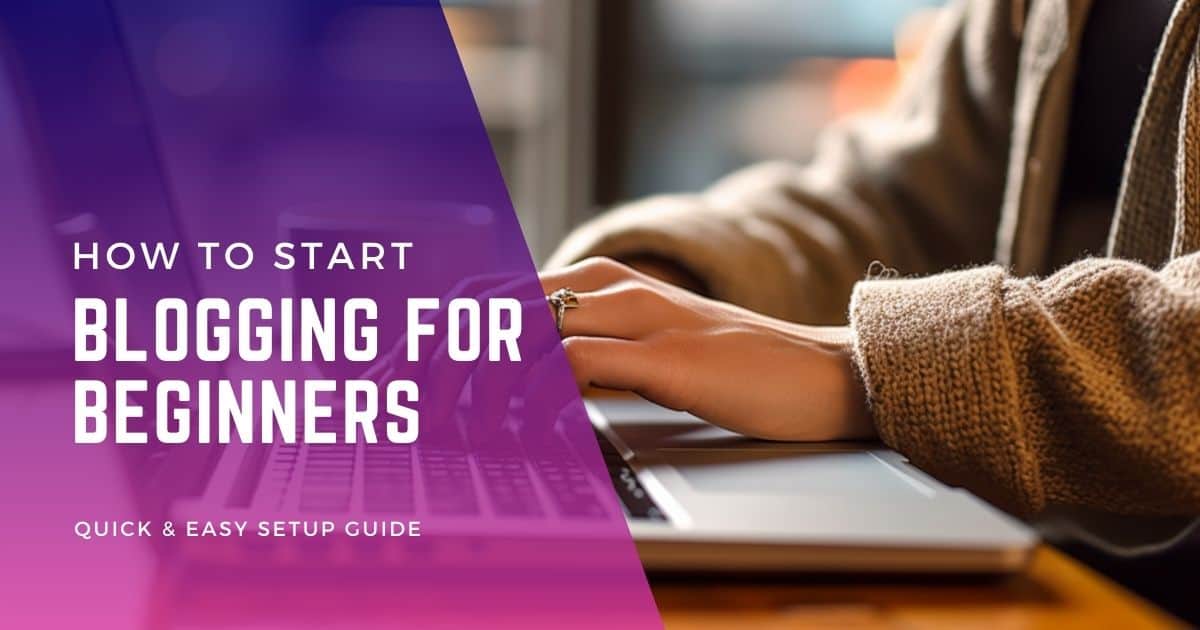Wondering what a blog is? Many people look to blogs to share insights and stories or to market their businesses.
Blogs allow for the expression of thoughts, expertise, or personal experiences. Yet, initiating or expanding a blog might seem daunting with so much competition. This challenge often makes it hard for your content to stand out.
Understanding blogging’s true value is key. Expert advice can help you cut through the clutter and make your mark. As a professional blogger, I have seen how specific strategies can massively boost a blog’s reach and reader engagement.
Focusing on genuine content and clever marketing can transform your blog into a go-to source for your audience. For bloggers, marketers, or entrepreneurs, applying these strategies can greatly improve your online visibility and open opportunities for growth and profit.
What is a Blog?
A blog is a digital platform that hosts written content, often reflecting personal or professional insights, updates, and discussions. Typically maintained by individuals or organizations, blogs serve as dynamic websites where posts are arranged in reverse chronological order.

What is Blogging?
Blogging refers to writing, editing, and publishing content on a blog. It allows individuals or groups to share information, opinions, and experiences with an online audience.
Brief history of blogging
Over the years, blogging become a powerful tool for businesses, journalism, professionals, and enthusiasts.
- Mid-1990s: Justin Hall (Swarthmore College student) created Links.net (1994), considered the first blog, though the term hadn’t been used yet. It featured links and commentary (https://en.wikipedia.org/wiki/History_of_blogging).
- 1997: Jorn Barger coins the term “weblog” to describe his online link collection and commentary on Robot Wisdom (https://firstsiteguide.com/robot-wisdom-and-jorn-barger/).
- Late 1990s: The term “blog” was shortened from “weblog” by programmer Peter Merholz.
- 1999: – Blogger, a free blogging platform, launches, making it easier for anyone to create a blog (https://online.ndm.edu/news/communication/history-of-blogging/). This helps propel the rise of blogging.
What is a Blogger?
A blogger is an individual or a group that creates and manages content on a blog. Bloggers share their thoughts, expertise, and experiences on relevant topics through written posts, images, videos, or podcasts.
Bloggers play an important role in shaping online conversations and influencing audiences across different niches.
What is a Blog Post?
A blog post represents an individual entry or article posted on a blog. It typically includes text, multimedia elements like images or videos, and hyperlinks to other related content.
Blog posts are essential for engaging readers, conveying information effectively, and driving traffic to the blog site.
What is the purpose of a blog?
Blogs are online spaces where people share knowledge and experiences in writing, pictures, or videos. Their purpose is to inform, educate, entertain, or persuade readers on a wide range of topics.
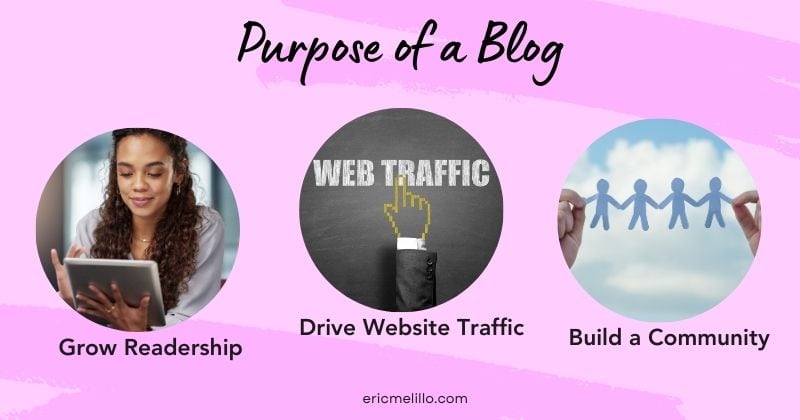
Grow Readership
One key aspect of blogs is that they are often updated regularly with fresh content. This helps build a loyal readership and engage with the audience consistently.
Blogs also allow for interaction through comments, enabling readers to share their thoughts and opinions on the content.
Drive Website Traffic
Moreover, blogs can be a valuable tool for businesses and professionals looking to establish themselves online.
By creating relevant and engaging content, companies can attract potential customers, drive website traffic, and ultimately increase sales.
For individuals, blogs can be a personal branding platform to showcase their skills and expertise in a particular field.
Build a Community
In essence, the purpose of a blog is not only to disseminate information but also to create a sense of community among like-minded individuals. It fosters conversation, sharing of ideas, and networking opportunities across different regions and cultures.
Blogs have become an integral part of our digital lives, offering readers a diverse range of voices and perspectives worldwide.
Benefits of Blogging
|
Benefits |
Description |
|---|---|
|
Increased online visibility |
Blogging can help increase your website’s visibility in search engines |
|
Establishing authority in your niche |
Regularly posting high-quality content can position you as an expert |
|
Building relationships with readers |
Engaging with readers through comments and social media can create a community |
|
Generating leads and sales |
Blogs can drive traffic to your website and convert visitors into customers or affiliate commissions |
|
Improving writing and communication skills |
Regularly writing blog posts can enhance your writing abilities |
Build Brand Authority
Regularly publish high-quality, industry-focused blog posts to establish yourself as a thought leader.
This builds trust and positions your brand as a go-to source for valuable information, increasing brand recognition as readers engage and share your content.
Boost SEO Power
Blogging is a game-changer for SEO. Search engines prioritize websites with fresh, relevant content.
By consistently adding new blog posts rich with targeted keywords, you improve your website’s ranking in search results, driving organic traffic.
Unlock Monetization Streams
A thriving blog unlocks exciting monetization opportunities. Explore affiliate marketing by promoting relevant products or services within your posts, earning commissions on sales.
I like to partner with brands for sponsored content or display targeted ads through platforms like Google AdSense, generating revenue based on clicks or impressions.
Why start a blog?
Starting a blog allows you to share your expertise, connect with like-minded individuals, and establish yourself as a credible authority in your field. By consistently providing valuable content, you can attract a loyal audience and potentially even monetize your platform.

Why Start a Personal Blog?
Creating a personal blog allows individuals to share their passions and interests with a global audience. It allows self-expression and creativity, enabling writers to document their thoughts, experiences, and expertise.
Personal Blog Benefits
Personal blogs can be online journals chronicling personal growth, travel adventures, recipes, or DIY projects. They offer a platform to connect with like-minded individuals, building a supportive community around shared interests.
Moreover, starting a personal blog can lead to personal branding opportunities and potential collaborations with brands seeking influencers in specific niches. It enables individuals to showcase their unique voices and perspectives.
Why Start a Business Blog?
Blogging for businesses is fundamental for building brand authority and credibility in their industry. It allows companies to establish themselves as thought leaders by sharing valuable insights, industry trends, and expert knowledge with their target audience.
Can anyone be a blogger?
Blogging is accessible to any beginner with internet access and a desire to share knowledge or experiences. Successful blogging, however, requires dedication, consistent content creation, and the ability to engage and grow an audience over time.
Business Blog for Marketing
A business blog is also a powerful marketing tool, driving traffic to the company website through search engine optimization (SEO) strategies. Businesses can attract potential customers and nurture existing relationships by consistently publishing high-quality content relevant to their products or services.
Maintaining a business blog enables companies to engage with their audience on a more personal level. Through blog posts, businesses can address customer concerns, provide solutions to common problems, and showcase the human side of their brand.
Difference between blog and website
- Blogs: Regularly updated websites focusing on a specific topic (fashion, travel, food) with new posts appearing first.
- Websites: Broader range of content, including static pages, e-commerce, and multimedia. They serve various purposes (business info, sales) and tend to be more professional and structured.
Key Difference: All blogs are websites, but not all websites are blogs. Blogs are a specific type of website focusing on regularly updated, informative content.
|
Aspect |
Blog |
Website |
|---|---|---|
|
Content |
Typically updated regularly |
Static or dynamic content |
|
Purpose |
Informal, personal, opinion |
Information or business |
|
Structure |
Reverse chronological order |
Hierarchical structure |
|
Interaction |
Comments and social sharing |
Contact forms and inquiries |
|
Design |
Simple layout, focused on content |
Varied design options |
Difference between wiki and blog
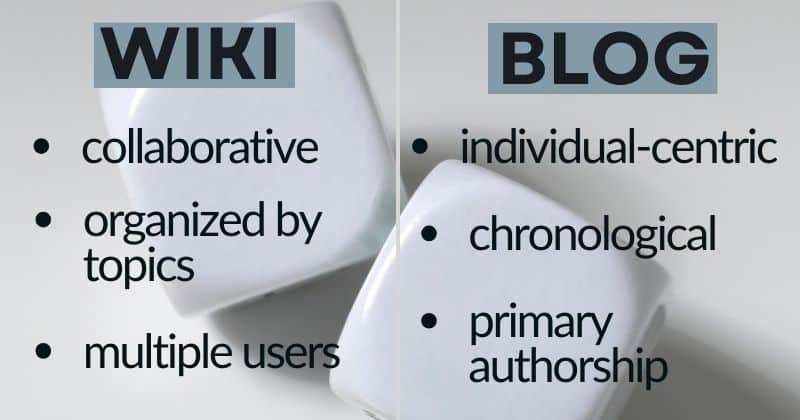
- Wikis: Collaborative platforms for building knowledge bases. Multiple users contribute, edit, and organize content.
- Blogs: Individual or small groups share information (opinions, expertise, news) chronologically. Focuses on regular updates and reader engagement (comments, discussions).
Key Difference: Wikis prioritize collaborative knowledge creation, while blogs focus on individual expression and ongoing updates.
|
Aspect |
Wiki |
Blog |
|---|---|---|
|
Content |
Collaborative, factual |
Individual, informative/persuasive |
|
Author |
Many contributors |
One main author (possibly with guest posts) |
|
Focus |
Knowledge collection |
Personal perspective/news |
|
Structure |
Chronological (newest first) or thematic |
Flexible, often thematic |
Types of Blogs
Blogs come in all sorts of flavors! You can find personal blogs about people’s lives, business blogs promoting companies, or niche blogs focusing on specific interests like fashion or tech. There are even professional blogs where experts share their knowledge. Here are a few of my favorites:

Personal Blogs
Personal blogs are informal and often reflective, focusing on the blogger’s personal experiences, thoughts, and interests. They offer a glimpse into the blogger’s life and personality.
Fashion Blogs
Fashion blogs are dedicated to style, trends, and beauty. Bloggers share outfit ideas, fashion tips, product reviews, and coverage of fashion events like runway shows.
Travel Blogs
Travel blogs document adventures around the world, providing travel tips, destination guides, itineraries, and personal stories. They often include stunning photographs to inspire wanderlust.
Food Blogs
Food blogs feature recipes, restaurant reviews, cooking tips, and culinary adventures. Bloggers share their love for food through mouth-watering photos and engaging storytelling.
Lifestyle Blogs
Lifestyle blogs cover a wide range of topics, such as health, fitness, home decor, relationships, and self-improvement. They aim to inspire readers to lead a fulfilling life in various aspects.
Parenting Blogs
Parenting blogs cater to parents seeking advice on raising children. Bloggers share parenting tips, family activities, product recommendations, and personal anecdotes about parenthood.
Typical blog layout
A typical blog layout usually includes a header with the blog title, a navigation menu, a main content area for blog posts, and a sidebar for additional information or widgets. The layout is designed to be user-friendly and visually appealing to engage readers.
Header
The header of a blog typically contains the blog’s name or logo, providing branding. It may also include a navigation menu with categories for easy browsing and content discovery.
Content Body
The content body is the main section where blog posts are displayed. Each post is usually shown with a title, date, author name, and the content itself. Readers engage with the actual articles here.
Sidebar
The sidebar is a vertical column on the side of the main content area. It often includes elements like search bars, social media links, popular posts, and advertisements.
Author Bio
An author bio section gives readers information about the writer of the blog post. It can include details about the author’s expertise and interests and a link to their personal website or social media profiles.
Comments
The comments section lets readers engage with the content by leaving their thoughts and feedback. It fosters the author’s and readers’ interaction, creating a sense of community.
Pros:
- Encourages reader engagement.
- Provides valuable feedback to authors.
- Builds a sense of community around the blog.
Cons:
- Requires moderation to filter out spam or inappropriate comments.
- Negative comments can sometimes discourage authors.
Footer
The footer is located at the bottom of the blog and often contains additional navigation links, copyright information, contact details, and disclaimers.
Essential blog pages
Having essential blog pages like About Us, Contact, and Disclaimer pages is crucial for providing transparency and credibility to your audience.
These pages help establish trust with readers, provide necessary information, and protect your blog legally.
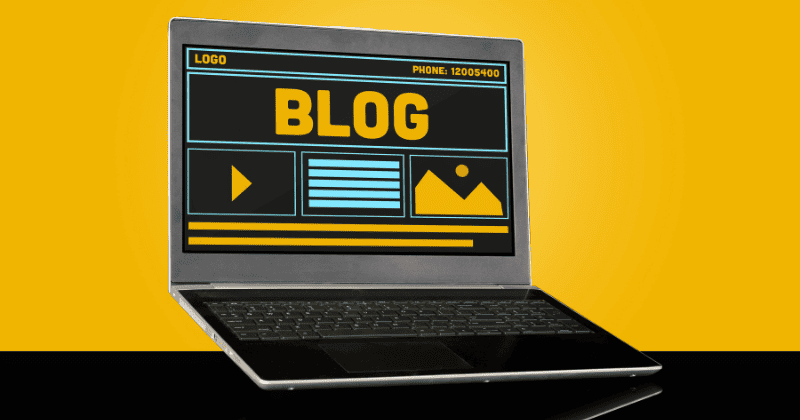
About Me
Create an “About Me” page to give readers a glimpse into who you are and what your blog is all about.
Share your story, interests, and expertise in a concise and engaging manner. Let your readers know they’re in the right place.
Contact
Develop a “Contact” page to provide an easy way for readers, brands, and fellow bloggers to get in touch with you. Include a contact form or list your email address for inquiries, collaborations, or feedback.
You can foster relationships and opportunities within the blogging community by offering clear communication channels.
Privacy Policy
Implement a “Privacy Policy” page to outline how you collect, use, and protect visitor data on your blog.
Clearly explain your data practices, such as cookie usage and information sharing, to build trust with your audience. Ensure compliance with data protection regulations to safeguard user privacy and enhance transparency.
Disclosure
Include a “Disclosure” page where you openly share any affiliations, sponsored content, or partnerships on your blog.
Be transparent about any financial interests or endorsements that may influence your content. You maintain credibility and honesty with your readers by being upfront about sponsorships or affiliate links.
Terms of Service
Integrate a “Terms of Service” page to establish guidelines for using your blog. Define user responsibilities, copyright policies, disclaimers, and limitations of liability to set expectations for visitors.
By outlining terms of service clearly, you protect your rights as a blogger and regulate user interactions on your platform.
How to Start a Blog?

Ready to share your passion and become an influencer? Starting a blog is your launchpad! It’s a fantastic way to connect with people who share your interests, show off your expertise, and become a trusted voice in your field.
By creating awesome content that resonates with your readers, you can build a supportive community and make a real difference. Here’s how:
Pick the Right Blog Topic
Select a topic that you are passionate about and has the potential to attract a large audience. Consider your interests, expertise, and the topic’s relevance in today’s online landscape.
Choose the Right Blogging Platform
When selecting a blogging platform, consider factors such as ease of use, customization options, and scalability. Popular platforms like WordPress, Blogger, and Wix offer user-friendly interfaces for beginners.
Choose a Domain Name
Your domain name is your blog’s online identity. Opt for a memorable name that is easy to spell and relevant to your niche. Ensure it reflects your brand and resonates with your target audience.
Purchase a Web Hosting Plan
Invest in a reliable blog hosting plan to ensure your blog is accessible 24/7. Before deciding, compare hosting providers based on factors like uptime guarantees, customer support, and pricing plans.
Install WordPress
WordPress is a versatile content management system (CMS) that powers millions of websites worldwide. Its intuitive interface makes it easy to create and manage blog content effectively.
Design Your Blog by Choosing a WordPress Theme
Customize the look and feel of your blog by selecting a WordPress theme that complements your content style. Themes range from minimalist designs to vibrant layouts, catering to various preferences.
Install WordPress Plugins
Enhance your blog’s functionality with WordPress plugins that add features like social media integration, SEO optimization, contact forms, and analytics tracking. Explore plugin directories for options tailored to your needs.
Blog Set Up & SEO
Optimize your blog for search engines by implementing SEO best practices such as keyword research, meta tags optimization, image alt text inclusion, and internal linking strategies. This helps improve visibility and organic traffic.
Write Your First Post!
Craft engaging content for your inaugural post that introduces readers to your blog’s purpose and sets the tone for future posts. Focus on providing value, addressing reader pain points, or sharing personal experiences.
Content Planning
Effective content planning involves strategically mapping out topics, formats, and timelines to ensure a consistent flow of engaging and relevant content for your audience.
So, map out your entire content plan by deciding on your content hubs, supporting sub-topic clusters, and a timeline to accomplish.
Boost Your Traffic, Promote Your Blog, & Master Social Media
Leverage social media platforms like Facebook, Instagram, X (Twitter), and Pinterest to promote your blog content. Engage with followers through regular updates, contests, influencer collaborations, or live sessions.
Build Your Email List
Encourage visitors to subscribe to your email list by offering exclusive content or freebies in exchange for their email addresses. Use email marketing tools to send newsletters, updates on new posts, or promotional offers.
Blog SEO
Blog SEO involves optimizing blog content to improve visibility in search engine results. This process includes using relevant keywords, creating high-quality content, ensuring fast loading times, and acquiring backlinks. Effective Blog SEO enhances user engagement and drives organic traffic.
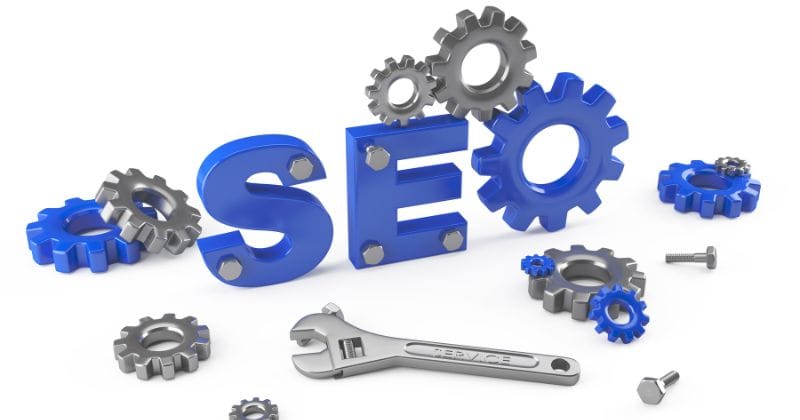
Relevant Keywords
When optimizing your blog for search engines, utilize relevant keywords that reflect the content of your posts. Incorporate these keywords naturally within your blog posts to improve visibility.
Including long-tail keywords can also help target specific audiences searching for detailed information. Research popular search terms in your niche and strategically place them throughout your content.
Internal Linking
Internal linking is crucial for SEO as it helps search engine crawlers navigate your site and discover new content. Link to related posts within the content hub of your blog to guide visitors to other relevant content, increasing engagement and showing Google the topical relevance.
How to Make Money Blogging
To make money blogging, focus on creating valuable content, optimizing for SEO, and engaging with your audience.
Monetization strategies include affiliate marketing, sponsored posts, selling digital products or services, and displaying ads through networks like Google AdSense.

How much money can you make with a blog?
In my experience, blog earnings vary widely, depending on niche, traffic, and monetization methods. Bloggers can make from a few dollars to over $100,000 monthly through affiliate marketing, ads, sponsored content, and selling products or services.
Success typically requires consistent, high-quality content, SEO optimization, aggressive link building, and pure determination.
Blog Monetization Strategies
Building multiple income streams is a powerful strategy for maximizing your earning potential. By diversifying your revenue sources, you create a safety net and open yourself up to significant growth.
Display Advertising
Implementing display advertising is a common way for bloggers to generate revenue. These ads are placed on your website, and you earn money based on the clicks or impressions they receive. Popular ad networks like Google AdSense offer easy integration for beginners.
PRO TIP: Once you start generating significant traffic, Ad Networks like Ezoic, MediaVine, and Raptive (formerly AdThrive) will be more lucrative than Google AdSense.
Affiliate Links
Affiliate marketing involves promoting products or services through special tracking links. When your audience purchases through these links, you earn a commission. Selecting relevant products that align with your content can increase your chances of earning more.
Sponsored Posts
Collaborating with brands for sponsored posts is another profitable avenue. Companies pay you to create content that promotes their products or services. Maintaining authenticity while endorsing these offerings is crucial for credibility.
Products and Services
Creating and selling your products or services can significantly boost your blogging income. This direct revenue stream allows you to capitalize on your expertise and cater to your audience’s needs. Offering value-added solutions can enhance customer loyalty and drive sales.
How to grow your blog
To grow your blog, you must connect with your target audience. Utilize social media, SEO strategies, and collaborations with other bloggers to increase visibility and attract more readers.

Repurposing and Syndicating Content
Repurposing content involves reusing existing material in different formats, such as turning a blog post into a video. Syndicating content means sharing it on various platforms and expanding its reach.
Utilize tools like Canva to create infographics from blog posts or convert articles into podcasts. Syndicate your content on social media platforms like LinkedIn and Medium for wider exposure.
Internal and external linking
Implementing internal links within your blog posts helps improve SEO and keeps readers engaged with more of your content. External links to reputable sites can enhance credibility.
Create a strategic internal linking structure by connecting related posts. When adding external links, ensure they are relevant and add value to the reader’s experience.
Social Media
Leverage social media platforms like Facebook, Instagram, and Twitter to promote your blog posts. Engage with followers through interactive content, polls, and stories.
Share snippets of your blog posts on social media with compelling captions to drive traffic to your website. Utilize hashtags effectively to expand your reach and attract new audiences.
Guest Blogging
Collaborate with other bloggers or websites by writing guest posts to tap into their audience. This can help increase visibility, establish authority, and drive traffic back to your blog.
Guest blogging allows you to reach a new audience interested in your niche. Focus on providing valuable content that aligns with the host site’s audience preferences.
Engaging with Influencers
Connect with influencers in your niche who can promote your blog to their followers. Their endorsement can significantly boost credibility and attract more visitors to your site.
Engage with influencers by commenting on their posts, sharing content, or collaborating on projects. Building relationships with influencers can lead to long-term partnerships and increased visibility.
Paid Promotion
Consider investing in paid promotion strategies like Google Ads or social media ads to reach a larger audience quickly. Target specific demographics based on interests or online behavior.
Paid promotions can help accelerate growth by increasing visibility and driving targeted traffic to your blog. Monitor analytics to optimize campaigns for better results.
Final Thoughts
Blogging plays a key role in knowledge sharing, offering personal views, and boosting business tactics. Understanding a blog helps both individuals and organizations communicate effectively with a wider audience.
Please share your blogging insights or questions with us. Your contributions make our discussions richer and encourage idea exchange.
Look forward to further exploration of blogging’s diverse aspects. The adventure in digital sharing and connections is just starting.
FAQs
What is a blog and example?
A blog is a digital platform where individuals or groups publish content on various topics. Examples include personal blogs, sharing life experiences, and business blogs, focusing on industry insights. They serve as a medium for information sharing and community engagement.
Are blogs still a thing?
Blogs remain highly relevant in 2025, serving as vital platforms for sharing expertise, boosting SEO, and engaging with targeted audiences. They are a gold standard for businesses and individuals aiming to establish authority and improve online visibility.
What qualifies as a blog?
A blog qualifies as a digital platform that features regularly updated content related to specific subjects or personal interests. It is characterized by its conversational style and the ability to invite reader interaction through comments.
What is the definition of a blog?
A blog, abbreviated from ‘weblog,’ is an online journal or informational website displaying information in reverse chronological order. It is a platform where writers or groups share their views on an individual subject, encouraging reader engagement.


